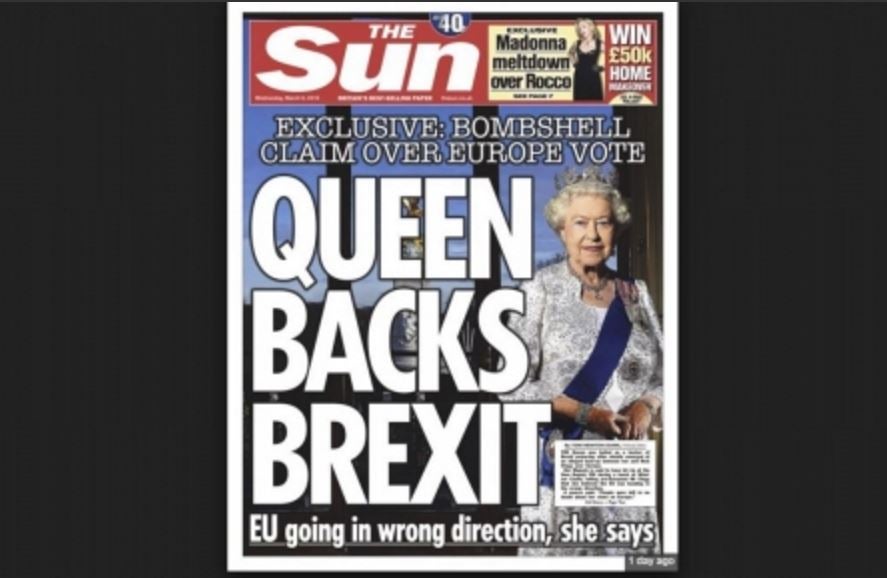
The Sun’s “Queen backs Brexit” headline was inaccurate, the Independent Press Standards Organisation (IPSO) has ruled.
The ruling was forced on The Sun after it refused to publish a correction for The Queen.
It was ordered to publish the critical adjudication on page two, which it did across five columns today, and also to flag it up on the front page.
Buckingham Palace complained about the story published on 8 March which detailed an occasion in 2011 when the Queen allegedly vented her anger with Brussels at the strongly pro-EU Nick Clegg during a lunch at Windsor Castle when he was deputy prime minister.
IPSO found the newspaper’s headline had breached Clause 1 (accuracy) of the Editors’ Code of Practice (but it did not deal with the article itself).
The front-page headline read: “Queen backs Brexit” and the paper quoted a ”senior source” as saying that people who heard their conversation ”were left in no doubt at all about the Queen’s views on European integration”.
The article said two unnamed sources had claimed that the Queen made critical comments about the EU at two private functions – first with Nick Clegg at a lunch for Privy Counsellors at Windsor Castle in 2011, and at a reception for MPs at Buckingham Palace.
At the time, former Liberal Democrat leader Clegg dismissed the report as ”nonsense”, while the Palace said: “The Queen remains politically neutral, as she has for 63 years.
”We will not comment on spurious, anonymously sourced claims. The referendum is a matter for the British people to decide.”
Justice Secretary Michael Gove refused to rule out being the source of the leak and The Sun said it stood by its story and planned to defend against the complaint “vigorously”.
The Queen’s representatives noted that on 1 January 2016, IPSO adopted a revision to Clause 1 of the Editors’ Code of Practice, which makes specific reference to “headlines not supported by the text” as an example of inaccurate, misleading or distorted information which the press must take care not to publish.
They said the Queen was “unable to comment on the accuracy of the reports of the alleged conversations which formed the basis for the article as, by convention, the Monarch does not comment on private conversations”.
But they said The Sun should not have taken a ‘no comment’ response from the Queen’s spokesperson as supporting the truth of the article.
The Sun said that readers would have seen the prominent strapline and sub-headline which accompanied the headline, and would have known from these that the headline referred only to a “claim” that the Queen backs Brexit.
It said: “This was a story of genuine public interest and the Code should not impose unrealistic expectations on how editors present stories, providing that readers are not misled. The revision to Clause 1 of the Code did not prevent newspapers from publishing editorialising or hyperbolic headlines.”
It said Sun readers understood headlines questioning whether Tony Blair was “the most dangerous man in Britain” or stating “If Kinnock wins today will the last person to leave Britain please turn out the lights” were not to be taken literally.
IPSO said: “The newspaper had highlighted its history of publishing playful, hyperbolic headlines which were not intended to be read literally. Such headlines are a powerful tool, used to convey the heart of a story, or as part of campaigning journalism in the public interest.
“The Committee recognises their importance as a feature of tabloid journalism, and emphasised that the revision to the Code does not prohibit editorialising or the use of the sort of celebrated headlines to which the newspaper had drawn the Committee’s attention.
“However, the print headline went much further than referring to a claim about what the Queen might think. It was a factual assertion that the Queen had expressed a position in the referendum debate. This was supported by the sub-headline, which gave the misleading impression that she had made a contemporaneous statement that the EU was ‘going in the wrong direction’. The same assertion was made by the online headline, which was not capable of being construed as a claim.
“In contrast to the examples the newspaper had given, there was nothing in the headline, or the manner in which it was presented on the newspaper’s front page, to suggest that this was the newspaper’s conjecture, hyperbole, or not to be read literally.
“The headline – both in print and online – was not supported by the text and was significantly misleading. The headline contained a serious and unsupported allegation that the Queen had fundamentally breached her constitutional obligations in the context of a vitally important national debate.
“Furthermore, it did not follow from the comments the article reported that the Queen wanted the UK to leave the EU as a result of the referendum: that suggestion was conjecture and the Committee noted that none of those quoted in the story were reported as making such a claim.
“Publication of the headline represented a failure to take care not to publish inaccurate, misleading or distorted information in breach of Clause 1 (i).
Email pged@pressgazette.co.uk to point out mistakes, provide story tips or send in a letter for publication on our "Letters Page" blog
